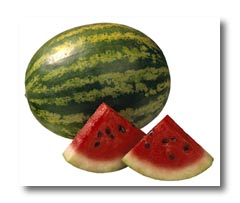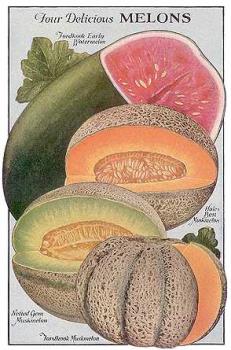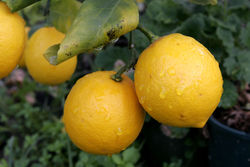The benefits of eating melons
By jasjon
@jasjon (252)
Philippines
December 14, 2006 12:33am CST
Melons are good sources of beat-carotene and vitamin C. They may have an anti-clotting action on the blood. Melons are also thought to lower cancer and heart disease risk.
How much melon should you eat?
Melons are reasonably low in calories and can be eaten freely. They also have a very high water content.
Maximizing the benefits of melons
Melons with a lighter yellow or green colour as well as watermelons contain less vitamin C and beta-carotene than orange melons do.
5 people like this
27 responses
@ozangel82 (753)
• Australia
15 Dec 06
Sorry for the double post, i didnt think it worked the first time, and then i found a cool pic to go with it too!
@imranwajid (741)
• Germany
14 Dec 06
I eat fruits not looking at their benefits. Rather to enjoy. my belief is all natural foods are somehow beneficial and we should eat all of them and benefits will appear naturally. We should not count calories
@anandsaab (590)
• India
15 Dec 06
Watermelon (Citrullus lanatus, Family Cucurbitaceae) is a fruit and plant of a vine-like (climber and trailer) herb originally from southern Africa. This flowering plant bears an accessory fruit of a type that botanists call a false berry. The watermelon fruit, loosely considered a type of melon (although not in the genus Cucumis), has a smooth exterior rind (green and yellow) and a juicy, sweet, usually red or yellow interior flesh but sometimes orange. The flesh consists of highly developed placental tissue within the fruit. The species descriptor Citrullus vulgaris is sometimes, synonymously, used to refer to this plant (vulgaris meaning "common" — Shosteck, 1974).
@Blackpepper1 (94)
•
14 Dec 06
My favourite is Honeydew Melons.When they are cheap I buy them and have a slice of it every morning before having anything else to eat at breakfast.
It is a good way to get your vitamins and water too.Not sure how much you should have. Too much of one thing is not good.
@imranwajid (741)
• Germany
14 Dec 06
Just eat the different varieties of available fruits and get all the benefits from different sources. dont focus on one only
@vishnukompella836 (160)
• India
14 Dec 06
Summer melons are also known as dessert melons. Some popular varieties include the following:
-- Cantaloupes, as they are called in North America, are netted melons are named for the town of Cantalupo near Rome where they grew profusely on papal estates, the first melons to grow in Europe. In Europe, these melons are known as musk melons or nutmeg melons, and take their name from the Romans' habit of sprinkling the fruit with powdered musk to accentuate the flavour. Now, musk melons are often hot-house grown. They are the most fragrant and delicious of melons, but this category of melons can vary greatly. They do have one thing in common, a network pattern on its skin which overlays and stands out from the surface. The skins may be whitish, yellow, or green and they may, or may not, be segmented. The flesh is usually orange, and the size varies from small to quite large. In North America, the two most important types of netted melons are known as Cantaloupe and Persian. Although the canteloupe has a prominently raised net and is round to slightly oblong, the Persian has a less prominently raised net, with larger spaces between the net lines and a distinctive aromatic flavour. These melons do not ripen well after being picked, but is best accomplished at room temperature. Chilling melons before eating makes them more refreshing, but does retard the flavour. To test for ripeness, press the end opposite to the stem. If the melon is ripe, it will yield quite noticeably.
@classy56 (2880)
• United States
14 Dec 06
Thanks for the info..now i know how to check a mellon for ripeness. i always squeese it if it felt soft i would buy it
@The_Sexy_Kid (122)
• India
26 Dec 06
All melons are healthy and wholesome but among them the prime is Watermelon. Watermelon is a fruit and plant of a vine-like herb originally from southern Africa. Although so-called "seedless" watermelons have far fewer seeds than the seeded varieties, they generally contain at least a few soft, pale seeds. Fresh watermelon may be eaten in a variety of ways and is also often used to flavor summer drinks and smoothies. A one-cup serving of watermelon will provide around 48 calories. Watermelon is an excellent source of vitamin C and vitamin A, with one serving containing 14.59 mg of vitamin C and 556.32 IU of vitamin A. Watermelon also provides significant amounts of vitamin B6 and vitamin B1, as well as the minerals potassium and magnesium. Pink watermelon is also a source of the potent carotenoid antioxidant, lycopene.
@KrauseHome (36445)
• United States
14 Dec 06
This is interesting facts. I knew they were good for you, but not for these reasons. Thanks for sharing.
@malsun (1528)
• United States
15 Dec 06
i usually have 2-3 slices of melons after dinner. I dont know if that is more or less or just right.
@lilaclady (28206)
• Australia
14 Dec 06
Thank you once again, I like reading your nutrician posts, I am trying to eat more healthy and this post is good because my very favourite is watermelon, thanks again.
@michaelvanx (568)
• Malaysia
14 Dec 06
Fruits are such a delight to the senses. Of all the foods available to us, fruits are the most attractive, delicious and enjoyable. Of all natural foods, that is, the foods we can eat in their natural state, fruit is the food we are most attracted to and that first entices our senses. Humans are born with a natural instinct for sweet foods and in nature, that instinct naturally draws us to fruit.
When we are hungry - and I mean really hungry - fruit is often the most satisfying food we can eat. Is there anything better than to devour a delicious ripe mango on a hot summer day? Or to bite into a luscious, freshly-picked apple? Or to enjoy a sweet, juicy ripe orange? Is there any man-made dish that can beat the perfection of a fully ripe cherry?
Fruits have been consumed by human beings going as far back in time as we know, whereas grains, legumes and dairy products have only been cultivated for 10,000 years or less, which is just a breath in the life of humanity. Anthropological studies have shown that fruit has been an important part of the human diet for hundreds of thousands of years.
Fruit has always been recognized as one of the healthiest foods there is. In the minds of most people, fruit is seen as a healthy food we should eat more of due to its vitamin content. But even when realizing the exceptional nutritional qualities of fruit, very few people actually give it the place it deserves in the diet. Fruit is still eaten as a “snack” or a “dessert,” but is rarely seen as a staple food. In the mind of the masses, fruit is a “healthy snack” but not something that can really sustain a hard-working man, like meat or bread. They don’t realize that fruit should be a staple in the diet, and has been for thousands upon thousands of years, long before bread and rice were cultivated, and long before cheese, sandwiches and twinkies were invented.
Fruit eating offers many benefits:
* Fruit is the best source of the natural sugar needed for energy.
* Fruit is packed with vitamins, and still represents the best source of vitamins in any food.
* Fruit is packed with anti-oxidants.
* Fruit is easier to digest than grains. Fruit is basically pre-digested. Digesting ripe fruit hardly requires any digestive enzymes, and is thus less taxing to the body.
* Fruit is alkaline forming (whereas meat, fish, grains and legumes are acid-forming).
* Fruit contains an abundance of pure water.
* Fruit is easy to eat. It doesn’t require much preparation.
* Fruit is beautiful. All of our senses are nourished by fruit, not just our taste buds.
* People who eat lots of fruit live longer. A study published in the British Medical Journal (September 2001), showed that fresh fruit offers the best bet for a long life. The results of a study showed that frequent fruit eaters had a 32 percent lower risk of dying from cerebrovascular disease such as stroke, and a 24 percent lower risk of dying from ischemic heart disease, than those who ate fruit less than once a day.
* Fruit contains lots of fiber, which is necessary for optimum digestion
@blanksolid (1631)
• Spain
14 Dec 06
Melons provide a good source of potassium and vitamin C. Like many other fruits, they
are also fat and cholesterol free, high in water content, and are relatively low in calories.
Many melons originated in the Middle East and their popularity was gradually spread
across Europe. Of all the melons, ancient Egyptians and Romans mostly consumed
cantaloupes and muskmelons.
Have a great day on mylot!





















